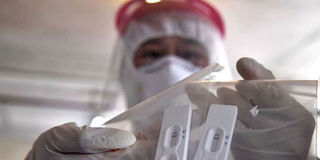WHO rapid testing kits to boost fight against virus

A medic displays a new rapid testing kit for the Covid-19. Kenya will be among the first low and middle-income countries in Africa to receive rapid diagnostic test kits.
What you need to know:
- About 120 million kits will be available for low and middle-income countries and will be distributed by the Africa CDC and Unitaid at a subsidised rate of Sh500 per unit for six months.
- Lack of enough testing of Covid-19 has been the greatest impediment in the fight against the pandemic.
Kenya will be among the first low and middle-income countries in Africa to receive Covid-19 rapid diagnostic test kits as scientists battle to contain the pandemic.
The World Health Organisation (WHO) Africa Director, Dr Matshidiso Moeti, said in Nairobi yesterday the deployment of the antigen kits will boost the level of testing and make contact tracing easier.
“We are pleased and encouraged to be able to share information about the emergency use licence that WHO has given to a couple of rapid tests. All of our low and middle income countries, virtually the whole of Africa will have some of these tests made available,” said Dr Moeti.
The test, which takes between 15 and 30 minutes, will change the situation, now that more countries are opening up economies and allowing movement of people. Burkina Faso, Cameroon, DRC, Ethiopia, Ghana and Malawi will also receive the kits.
Middle-income countries
About 120 million kits will be available for low and middle-income countries and will be distributed by the Africa CDC and Unitaid at a subsidised rate of Sh500 per unit for six months.
“They will help some of our countries to increase the testing rates to be on top or ahead of the situation so that we can contain the uptakes that we are expecting and anticipating, now that countries are forced to open up the movement of people and their economies,” said Dr Moeti. “But testing cannot work in isolation. Just the way the tests are rapid, it is important for contact tracing to be rapid so that you isolate them before they spread the virus further,” she added.
Lack of enough testing of Covid-19 has been the greatest impediment in the fight against the pandemic. Kenya has so far tested slightly over one per cent of its population, despite the rapid transmission of the virus at the community level. Of the 699,520 tests done by November 1, some 55,877 people had tested positive, constituting eight per cent of the tests against 47 million people.
Chain reaction
Kenya has been utilising the Polymerase chain reaction (PCR) method to test for Covid-19 and despite an increase in the number of laboratories undertaking the tests to more than 30, the turnaround time is still slow and ranges between 24 hours and several days.
As a result, tracing of contacts has been poor. Unlike the long and ‘scary’ PCR method, the antigen tests are easy and will be deployed at the point of care. According to WHO, they are best in areas where health systems are under-resourced.
The Ministry of Health has on several occasions complained about shortages of reagents in the PCR tests. “It is going to be challenging in acquisition of reagents due to the global surge of Covid-19,” Health Cabinet Secretary Mutahi Kagwe said yesterday.
In a past briefing, Health Director-General Patrick Amoth said Kenya targeted 7,000 tests daily. “The best case scenario would be to test one person per 1,000, this means that per week we need to be doing 50,000 tests, meaning that per day we need to do 7,000 tests.”
He said it is only through such kind of intensive testing that Kenya will be able to understand the true picture of the evolution of the disease at community level.





